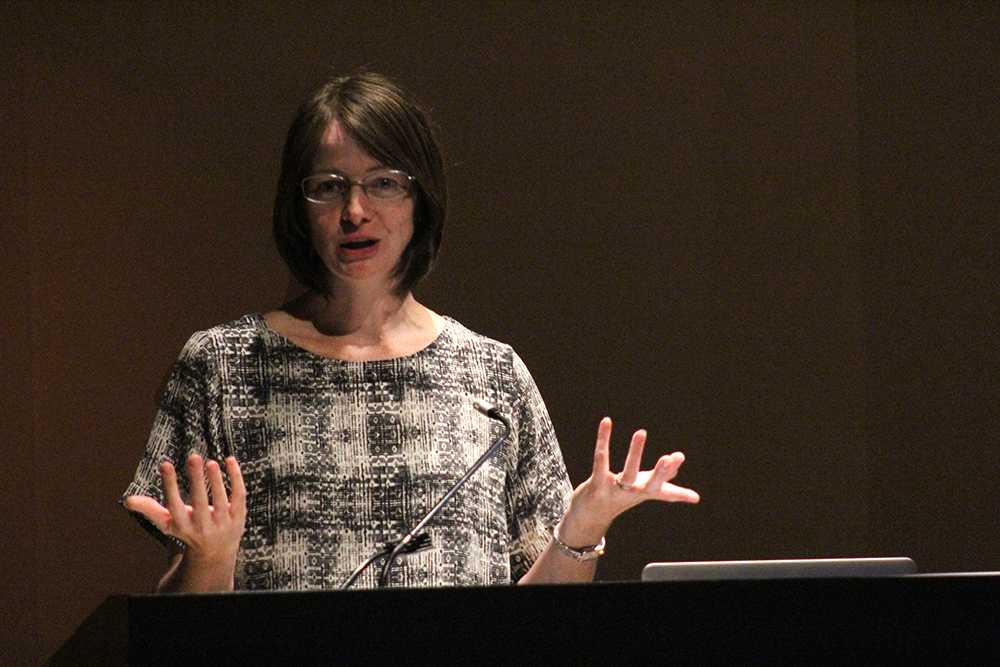Amputees in the media discussed at fall lecture
September 16, 2015

Dr. Andrea Smith, professor of English and gender studies a the University of Utah, gave a speech about the way amputees are portrayed in the media on Wednesday in the Doudna Fine Arts Center lecture hall.
Digital amputations was a topic presented at the annual fall lecture put on by Phi Beta Kappa Wednesday in the Doudna Fine Arts Center lecture hall.
Angela Smith, an associate professor of English and gender studies at the University of Utah, shared her research of how amputees are portrayed in the media.
Smith was invited to speak at the 25th annual fall lecture put on by the Phi Beta Kappa honors association.
Suzie Park, English professor and president of the Phi Beta Kappa alumni association, said she thought Smith would give an interesting lecture for the Eastern students.
“(Smith) is doing very interesting work on disabilities studies and film and I thought it would be a good draw for our campus,” Park said.
C.C. Wharram, English professor and the director of the center for humanities, said they try to get speakers who have a connection to people at Eastern so they feel more welcome.
“I went to university with Angela, I know her as a great scholar,” Wharram said.
Smith said she always had in interest in the human body and how it is portrayed and said she took a course about horror films when she was in graduate school.
“It suddenly occurred to me how much more visual and immediate depictions of damaged or disabled bodies were,” Smith said.
Smith said she became interested in how people respond to seeing hurt or disfigured bodies on screen.
Smith said she has been doing research since 1994, when she began her masters’ thesis in literature.
Smith said she has noticed an increase of disabled people in the media since soldiers have been returning from over seas.
“I think it is a good thing that there is greater visibility but I think it tends to be very sentimental,” Smith said. “They tend to be moving, like ‘oh this soldier lost his leg and his wife still loves him’.”
Smith said she does not think the portrayal of the returning injured or disabled veterans is shedding light on how the government is failing them.
Smith gave a lecture about the research she has done about how disabled people and amputees are portrayed in the media.
“An important way that disabilities are seen as innately bad is the focus on visual representations on the shocking moment of disabling,” Smith said.
Smith used examples of amputees from well-known movies, like Lieutenant Dan from “Forrest Gump” and Stephanie from “Rust and Bones,” a French film.
Smith said special effects and disability costumes worn by actors help portray an idea called ‘disability drag’.
Smith said disability drag is shown through the actions when they are seen as depressing or hopeless, in a way.
Smith showed a scene from “Forrest Gump” where Lieutenant Dan falls out of his wheel chair and had to get back in without help.
“In this scene, Dan’s disabled state shows an incapacity to move or express emotion competently,” Smith said. “He tries to convey a righteous anger but can only topple humiliation from the fall from the chair, and the agony to haul himself back up.”
Smith explained how the process most actors portraying an amputee have gone through and how special effects have changed over the years it has been used.
Smith talked about the movie “The Automobile Accident” and the use of a real amputee stunt double for the movie.
Smith showed a behind the scenes photo from the set where you see the able bodied actor sitting on break with his stunt double amputee.
Smith said the photo showed how filming would stop multiple times to switch out the able-bodied and amputee actors so the audience would not see the stunt double body move.
“When the camera was not filming, the (amputee) body did move in and out of position,” Smith said.
Smith said the use of digital effects in “Forrest Gump” produced a more seamless effect of an amputee in the cinema without the use of an actual amputee.
Megan Kessler, a senior history major, said she thought this lecture looked interesting because it talked about film and disabilities.
“You don’t usually think about disability in film, but it’s important,” Kessler said.
Mackenzie Freund can be reached at 581-2812 or at mgfreund@eiu.edu




































































